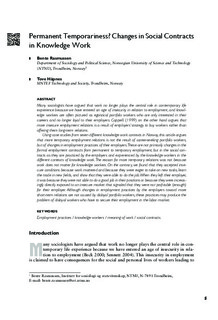| dc.contributor.author | Rasmussen, Bente | |
| dc.contributor.author | Håpnes, Tove Rigmor | |
| dc.date.accessioned | 2020-02-06T12:21:32Z | |
| dc.date.available | 2020-02-06T12:21:32Z | |
| dc.date.created | 2012-12-03T11:53:22Z | |
| dc.date.issued | 2012 | |
| dc.identifier.citation | Nordic Journal of Working Life Studies. 2012, 2 (1), 5-23. | nb_NO |
| dc.identifier.issn | 2245-0157 | |
| dc.identifier.uri | http://hdl.handle.net/11250/2640037 | |
| dc.description.abstract | Many sociologists have argued that work no longer plays the central role in contemporary life experience because we have entered an age of insecurity in relation to employment, and knowledge workers are often pictured as egoistical portfolio workers who are only interested in their careers and no longer loyal to their employers. Cappelli (1999) on the other hand argues that more insecure employment relations is a result of employers’ strategy to buy workers rather than offering them long-term relations. Using case studies from seven different knowledge work contexts in Norway, this article argues that more temporary employment relations is not the result of career-seeking portfolio workers, but of changes in employment practices of their employers. These are not primarily changes in the formal employment contracts from permanent to temporary employment, but in the social contracts as they are practiced by the employers and experienced by the knowledge workers in the different contexts of knowledge work. The reason for more temporary relations was not because work does not matter for knowledge workers. On the contrary, we found that they accepted insecure conditions because work mattered and because they were eager to take on new tasks, learn the trade in new fields, and show that they were able to do the job. When they left their employer, it was because they were not able to do a good job in their positions or because they were increasingly directly exposed to an insecure market that signaled that they were not profitable (enough) for their employer. Although changes in employment practices by the employers toward more short-term relations are not caused by disloyal portfolio workers, these practices may produce the problem of disloyal workers who have to secure their employment in the labor market. | nb_NO |
| dc.language.iso | eng | nb_NO |
| dc.publisher | Roskilde Unviersitet | nb_NO |
| dc.rights | Attribution-NonCommercial-NoDerivatives 4.0 Internasjonal | * |
| dc.rights.uri | http://creativecommons.org/licenses/by-nc-nd/4.0/deed.no | * |
| dc.subject | Employment practices | nb_NO |
| dc.subject | Knowledge workers | nb_NO |
| dc.subject | Social contracts | nb_NO |
| dc.subject | Meaning | nb_NO |
| dc.title | Permanent temporariness? Changes in social contracts in knowledge work | nb_NO |
| dc.type | Journal article | nb_NO |
| dc.type | Peer reviewed | nb_NO |
| dc.description.version | publishedVersion | nb_NO |
| dc.source.pagenumber | 5-23 | nb_NO |
| dc.source.volume | 2 | nb_NO |
| dc.source.journal | Nordic Journal of Working Life Studies | nb_NO |
| dc.source.issue | 1 | nb_NO |
| dc.identifier.cristin | 967242 | |
| cristin.unitcode | 7401,90,30,0 | |
| cristin.unitname | Teknologiledelse | |
| cristin.ispublished | true | |
| cristin.fulltext | original | |
| cristin.qualitycode | 1 | |

